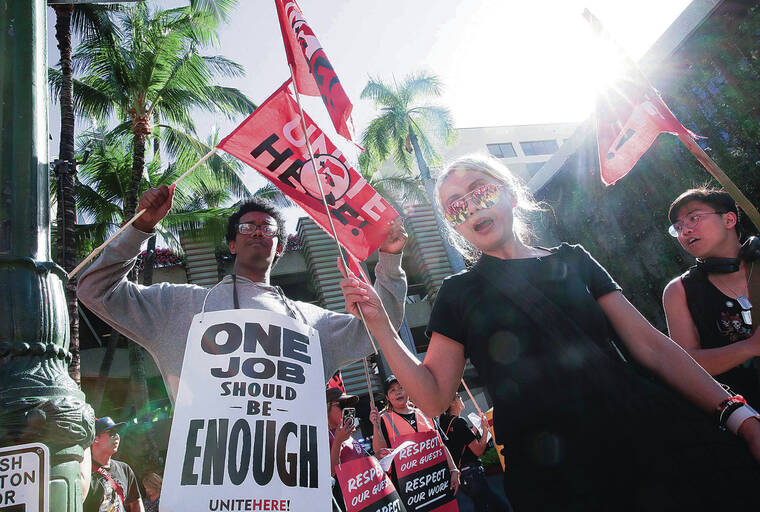HONOLULU — Jason Maxwell, a Unite Here Local 5 union member, stood in front of the Royal Hawaiian Center with a megaphone Wednesday, yelling labor solidarity chants.
Maxwell was just one of more than 1,500 workers who gathered at the 50-yard line of Waikiki on Wednesday to draw attention to issues facing Local 5 union workers as they kick off their latest round of bargaining. The workers rallied in Waikiki to celebrate International Workers’ Day on May 1 and to give a message to Hawaii’s hotel industry — “Respect Our Work” and “Respect Our Guests.”
Local 5 leaders said its hotel union workers are preparing for the possibility of widespread labor disputes with 17 Hawaii hotel contracts covering over 7,000 hotel workers set to expire at the end of next month. June The contract expirations are across three islands and a range of properties, including Waikiki Beach Marriott Resort & Spa; Sheraton Kauai Resort; Sheraton Maui Resort & Spa; Hyatt Regency Waikiki Beach Resort & Spa; Sheraton Waikiki, Moana Surfrider — a Westin Resort Spa; Sheraton Princess Kaiulani; The Royal Hawaiian, A Luxury Collection Resort; and the Hilton Hawaiian Village Waikiki Beach Resort.
Tensions already have been escalating at some properties, where Local 5 represents hotel workers. Local 5 workers at the Ilikai Hotel went on a one-day strike March 8, which also happened to be International Women’s Day, before the union and hotel company reached a strike-ending agreement on the first new contract in more than five years.
This time, masses of Local 5 members and their supporters marched throughout Waikiki before ending their action at the Duke Kahanamoku statue on Kuhio Beach.
Gov. Josh Green marched with union members in the all-ways crosswalks in front of the Royal Hawaiian Center and posed for many selfies with workers. Green then addressed workers after joining Cade Watanabe, financial secretary-treasurer of Local 5, on a grassy bank in front of the center.
“Mahalo for fighting to make sure that we really have got the most vibrant industry and the industry that treats people right. That’s why I’m here, I want you to be treated well,” Green said. “I want people to be able to earn a living and afford to live here in our beautiful state, and only need one job to survive. That’s what we want, and right now, I’m afraid to say that too often it is not easy to survive on just one job. That’s what we are fighting for, and I know that we can find a common ground.”
Green said the last few years have been tough, but Hawaii is recovering.
“We have recovered to 94% of where we were before COVID, but we haven’t adequately recovered for our workforce and so I wanted to say that I was here to fight for you for that purpose. I wanted to find a way forward for the good of all so that you can afford to live here, raise your families here, raise the grandkids here and so we can all stay and really celebrate Hawaii as one ohana. Thank you for being bold and brave.”
Maxwell said he finally bought a home in Hawaii six months ago but that it took two decades of working two union bartending jobs to afford it.
“We need respect for workers. Respect for the work that we do and respect for our guests,” he said. “Cutting services for guests cuts our jobs.”
Maxwell said Hawaii hotels can show their respect to workers and guests by raising wages and reversing the staffing cuts that have strained working conditions and reduced guest services and amenities.
Local 5 reports that a recent survey of its hotel workers showed that 73% have had to cover for the company when guests complain. Local 5 said when 4,000 of its members were surveyed, some 76% said that they “could not afford an unexpected bill of $500.”
Watanabe said in a statement, “Our industry is broken. For the thousands of hospitality workers in Local 5 who show up every day to serve our guests, we’re struggling to get ahead and can’t provide the level of service our guests deserve. We’re overworked, understaffed and undervalued, and ready to step up to ensure that we have a future in tourism that puts workers and our guests first.”
During the first quarter of this year, Hawaii hotels saw a key measure of hotel performance, revenue per available room, fall 0.9% to $289, but that was up 23.4% from 2019, according to statistics in the Hawai‘i Hotel Performance Report released by the Hawai‘i Tourism Authority.
First-quarter hotel occupancy reached 76.5%, a 1.4-percentage-point gain from 2023, but a drop of 4 percentage points from 2019. The average daily rate paid for a Hawaii hotel room during the first quarter was $378, down 2.7% from 2023, and up 29.8% from 2019.
Keith Vieira, principal of KV & Associates, Hospitality Consulting, said since 2019 significant investment has gone into repositioning Hawaii hotels.Vieira said hotel industry improvements have generated higher room rates and thus more tax dollars for the state and counties.
He added that hoteliers went forward with projects despite the COVID-19 shutdowns, and then rising costs and interest rates that significantly hurt their bottom lines.
“Hotels have been in survival mode for five years, and then the Maui fires came,” Vieira said. “Workers also have suffered. It’s not like one wins, one loses. It’s been very difficult for everyone. That’s part of why we were hoping to see a rebound in summer traffic so that next year we could bring everyone back to work and everybody could share in the growth of tourism, including the community in getting tax dollars. But it has been a very, very difficult five years.”


